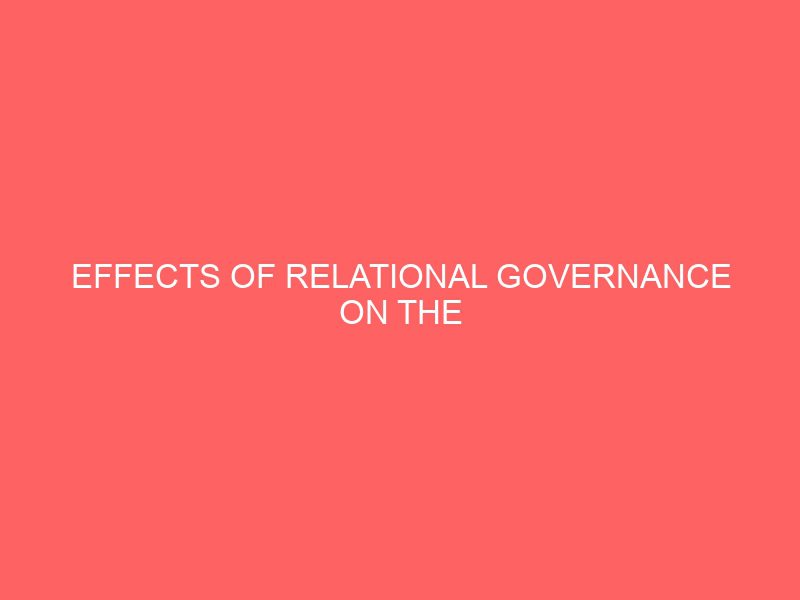Description
CHAPTER ONE
INTRODUCTION
1.1 Background of the Study
Different views have been expressed regarding how corporate organizations should achieve corporate advantage. For Chow et al (2005) and Dyer (1995) corporate organizations cannot just commence the exercise of the proprietary advantage. They hold, rather, that to enhance their ability to compete, they must work at the complex and sometimes delicate task of establishing corporate relationships with other suppliers. Relating the same view to making foreign direct investment, Chow et al (2005) citing Buckley et al (1976) and (Dyer, 1996) opine that manufacturing firms making foreign direct investments cannot simply enter foreign countries and commence the effortless exercise of their proprietary advantage. Rather, to enhance their ability to compete, they must work at the complex and sometimes delicate task of establishing cooperative relationships with suppliers in host countries. This presents the concept of the inevitability of interaction in organizations. Organizational interaction is inevitable because organizations are viewed as open systems where objects in their environments influence the behavior of the system?s part and the relationships among its parts. This is because open systems interact with their environment for the procurement of both inputs and economic resources and to satisfy other needs, which are essential for their survival (Onwuchekwa, 1993). The implication of this is that organizations cannot be completely isolated from their environment. How this interaction should be initiated and sustained for the benefits of the interacting organizations becomes a matter of concern as often duplicity comes into play due to the greed of some business partners? intention to outsmart each other. This hazardous situation brings up the question regarding the sort of governance arrangement that should be put in place to checkmate business opportunists, who capitalize on the ignorance of their business associates or partners. Poppo et al (2002), therefore, forward the view that transaction cost economics (TCE) has emerged as a common framework for understanding how managers craft governance arrangements. Williamson (1991) holds the proposition that managers align the governance features of inter-organizational relationships to match known exchange hazards, particularly those associated with specialized asset investments, difficult performance measurement or uncertainty. In response to exchange hazard, managers may craft complex contracts that define remedies for foreseeable contingencies or specify processes for resolving unforeseeable outcomes. Contract constitutes one of the ways managers craft governance arrangements regarding inter-organizational relationships (Poppo et al, 2002). Hill (1990) and Dyer (1997) however hold that there may be occasions when contracts may be costly to enforce. In such occasions managers may choose to vertically integrate. Views have been strongly expressed that transaction cost economics overstates the desirability of either integration or explicit contractual safeguards in exchange settings commonly labeled as hazardous. This view recognizes that in many industries managers engage in complex, collaborative market exchanges that involve rather high levels of asset specificity that are characterized by other known hazards(Dyer,1997). River ( 2010), reflecting on the evolutions that are going on in business interaction, is of the view that the ways business and government customers and service providers manage long term, complex services contracts have undoubtedly undergone a paradigm shift in recent years. So, rather than entering into a transaction defined by legally binding terms, parties now purposely enter into a loosely defined cooperative relationship intended to produce business outcomes like more cost efficient operations or increased competitive advantage in the market place. Still arguing against formal contract, River (2010) cites the views of the management consulting firm, Vantage Partners, that scholars in the fields of management and information system sciences argue that contracts and the negotiation process undermine outsourcing governance for several reasons. These reasons include that contract negotiations and reliance on terms create distrust between customer and provider, whereas governance is based on the existence of trust. Also the specification of service terms induces the moral hazard of not doing what is not written in the contract, while governance promotes it. Creating detailed, complex contracts inhibits the free exchange between customer and provider that is at the heart of governance. The net effect of relying on both contracts and governance to manage outsourcing, River (2010) holds, is a negative one. As a substitute for the complex and explicit contracts or vertical integration, therefore, relational norms such as trust are recommended (Bernheim and Whinston, 1998; Dyer and Singh, 1998; Adler, 2001). This reasoning views trust and its underlying normative behaviors as operating as a self-enforcing safeguard, that is, a more effective and less costly alternative to both contracts and vertical integration (Hill, 1990; Uzzi, 1997). Formal contracts are often held to be undermining a firm?s capacity to develop relational governance and may signal distrust of your exchange partner and by undermining trust encourage, rather than discourage, opportunistic behavior (Fehr and Gachter, 2000). Poppo et al (2002) also argue in support of the opinion that formal contracts actually undermine trust and encourage the opportunistic behavior which they are designed to discourage. These critiques of formal contracts view relational governance as a substitute for formal contracts. In the presence of relational governance, they hold that formal contracts are at best an unnecessary expense and at worst counter-productive and that relational exchange arrangements supported by trust are commonly viewed as substitutes for complex contracts in inter-organizational exchanges. Discussing relational and formal contracts in China, Zhou et al (2003) hold that countries with legal systems have courts to enforce contractual provision but interestingly in emerging economies such as China, in which the legal system is weak, the use of contracts is still prevalent. Also conventional institutional analysis suggests that emerging economies will translate from personal connections to rule-based institutions that support impersonal market exchanges. Similarly, the efficiency logic of transaction cost economics indicates that in market exchanges, contracts mitigate some of the inefficiencies that arise from exchange hazard, namely asset specificity and uncertainty (Williamson, 1996). Reiterating why formal contracts have not gained much ground in China, Boisot and Child, (1996) and Child et al (2003), counter that social institutions, which have governed exchange in China through norms and obligations for thousands of years, impede a reliance on the development of, and the use of formal institutions such as legal system and contract law with their efficiency-based logic for coordinating exchange. They express surprise that the use of contract is still prevalent in China despite the impacts of norms and obligations. Poppo et al (2007), posit that managers may be willing to modify contracts because relational governance gives them some assurance that both parties will honour the formal agreement and its intent and that relational practices further enforce the use of contracts as a framework for adaptation. For relational governance to thrive successfully, MacNeil (1978) suggests that exchange of information should be adopted as it will enable the involved parties to have better information about each other than any third party when adapting to unexpected exchange. As complementary relationship may also function in reverse, the continuity and cooperation encouraged by relational governance may generate contractual refinements that further support greater cooperation. Also relational governance may heighten the probability that trust and cooperation will safeguard against hazards poorly protected by the contract. This may help overcome the adaptive limits of contracts: a bilateral commitment to ?keep-on-with-it? despite the unexpected complications and conflicts (Poppo et al, 2002). Following the logic of transaction cost economics view, it is the manager?s task to craft governance arrangements with minimal cost that ensure the delivery of the desired quantity, price, and quality of a supplier?s services. The manager, therefore, crafts governance arrangements to match the exchange conditions that accompany various services. As exchange hazards arise, so must contractual safeguards (Williamson, 1985), which act to minimize the costs and performance losses arising from such hazards. As crafting a complex contract is costly, parties undertake such a cost only when the consequences of a contractual breach are considerable (Joskow, 1988; Heide, 1994). Transaction cost economics scholars also put forward three categories of exchange hazards, which necessitate contractual safeguards or vertical integration. These are asset specificity, measurement difficulty, and uncertainty. Asset specificity emerges when sourcing relationships require specific investments in physical and/or human assets. The presence of these specific assets transforms an exchange from a world of classical contracting in which the ?identity of parties is irrelevant? into a world of neoclassical contracting in which the identity of exchange partners is of critical importance (Williamson, 1991). The observation by many scholars, including transaction cost economists, is that the governance of inter-organizational exchanges involves more than formal contracts. Inter-organizational exchanges are typically repeated exchanges which are embedded in social relationships. Here governance emerges from the values and agreed-upon processes found in social relationships (John, and Nevin, 1990; Heide and John, 1992), which may minimize transaction costs as compared to formal contracts (Dyer, 1996; Dyer and Singh, 1998). From such relationally-governed exchanges occur the enforcement of obligations, promises, and expectations through social processes that promote norms of flexibility, solidarity, and information exchange. Flexibility facilitates adaptation to unforeseeable events. Solidarity promotes a bilateral approach to problem solving, creating a commitment to joint action through mutual adjustment. Information sharing facilitates problem solving and adaptation because parties are willing to share private information with one another, including short and long-term plans and goals. As the parties commit to such norms, mutuality and cooperation characterize the resultant behavior (Poppo et al, 2002). For Gulati (1995b: 93), trust avoids contracting costs, lowers the need for monitoring, and facilitates contractual adaptation. Trust counteracts fears of opportunistic behavior and as a result, is likely to limit the transaction costs associated with an exchange. This means that trust can substitute for contracts in many exchanges. Uzzi (1997) however holds that the embedding or fixing of exchanges within social structures circumvents and thus economizes on time otherwise spent in costly contract renegotiations, while Larson (1992) argues that formal contracts are rather unimportant in the exchange agreements examined. Poppo et al (2002) also opine that informal social controls push formal contracts to the background. If one party trusts the other, there is simply little need for contractually specifying actions and that relational governance lo







